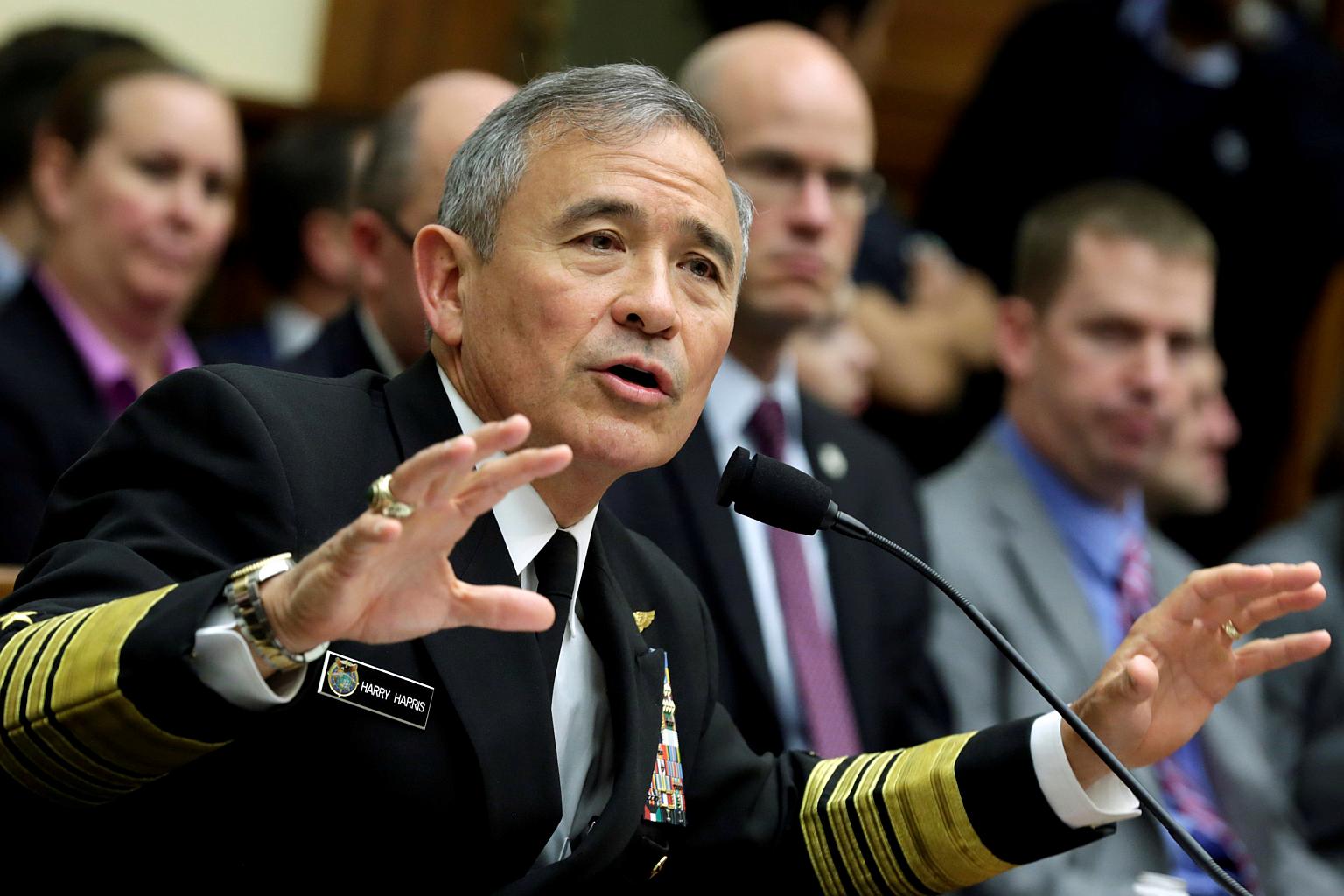Pause in US Navy operations will not affect US' ability to defend allies: Adm Harris
Sign up now: Get insights on Asia's fast-moving developments

The Commander of the US Pacific Command, Admiral Harry Harris, testifies before a House Armed Services Committee hearing Capitol Hill in Washington, U.S, April 26, 2017.
PHOTO: REUTERS
Follow topic:
OSAN (REUTERS, AFP, Boomberg, NYTimes) - The head of the US military's Pacific Command said on Tuesday (Aug 22) a scheduled"operational pause" by the US Navy's fleet worldwide would not affect the military's ability to defend South Korea.
Speaking at the Osan Air Base in South Korea, Admiral Harry Harris, commander of the US forces in the Pacific, said that the operational pause is "important" but added that pause "would not have an effect" on the US' ability "to defend our nation and our allies."
The US Navy ordered a fleet-wide investigation and plans for temporary halts in operations to focus on safety after a US guided missile destroyer collided with an oil tanker in waters near Singapore and Malaysia on Monday.
Commanders will space out the review to avoid hampering operations, like the war games in South Korea that started Monday.
The review will take place over a week in a series of 24-hour periods, during which on-board actions, as well as leadership and operational procedures, will be examined, reported CNN. Monday's collision is the fourth major accident in the US Pacific fleet this year.
In June, USS Fitzgerald collided with a Philippine-flagged cargo ship off the Japanese coast, resulting in the deaths of seven US sailors.
On May 9, the guided-missile cruiser USS Lake Champlain was struck by a small fishing boat off the Korean Peninsula.
In late January, the guided-missile cruiser USS Antietam ran aground while trying to anchor in Tokyo Bay.
All three US warships and USS McCain are equipped with the Aegis missile defence system that detects and intercepts ballistic missiles.
US Aegis-equipped naval ships stationed in the Pacific have been touted as a key line of defence against the North Korea missile threat.
Analysts said the string of accident raised questions about whether the US Navy was overstretched in Asia as it seeks to combat Chinese assertiveness in the South China Sea and North Korea's nuclear ambitions.
The string of accidents involving US naval ships has also dealt a heavy blow to US' prestige as the world's top military superpower, said observers. Chinese newspapers said the two collisions in two months showed that US' combat readiness level and military management level have declined and its naval vessels are becoming an increasing risk to commercial shipping in Asia.
The McCain been heading for a routine stop in Singapore after carrying out a "freedom of navigation operation" in the disputed South China Sea earlier in August around the Mischief reef in the Spratly Islands, sparking a furious response from Beijing.
Japan's defence ministry and military officials have voiced concerns that the collision between a US Navy destroyer and a tanker on Monday (Aug 21) may negatively affect the Japan-US security system with regard to North Korea, reported Yomiuri Shimbun.
The latest mishap and the order for the US Navy to have "one to two day" operational pause as part of a fleet-wide review came amid growing anxiety over a possible new missile launch by Pyongyang.
North Korea's military on Tuesday (Aug 22) threatened that it is ready to stage 'ruthless retaliation' against South Korea and the United States over their on-going joint military exercises that started on Monday.
Adm Harris and two other top US commanders- Strategic Command head General John Hyten and Missile Defense Agency director Lt-Gen. Samuel Greaves - travelled to South Korea observe the on-going Ulchi Freedom Guardian exercises. The 11-day exercises involve computer simulations designed to prepare for a possible attack by nuclear-armed Pyongyang.
Connecticut Representative Joe Courtney, the top Democrat on the House Seapower and Projection Forces subcommittee, said Congress needs to undertake "rigorous oversight" and review the "rising trend lines of accidents".
"Our sailors are asked to operate every day in contested waters vital to the interests of the United States," Courtney said in a statement.
"We need to make sure that they have the tools, training, and support they need to do their jobs successfully and safely."
Besides the operational pause, over a few months the US Navy will complete a longer-term, comprehensive review of US naval forces in Japan, including looking at training and certifying readiness.

